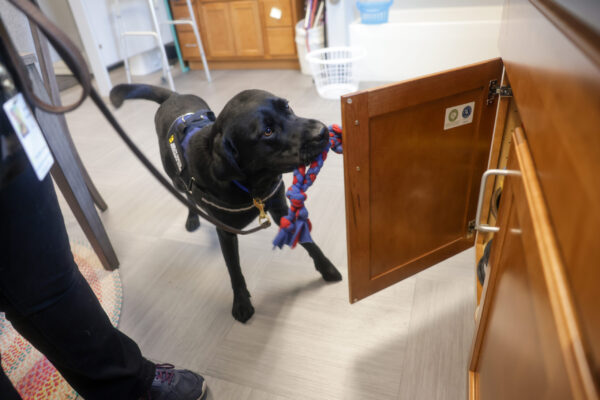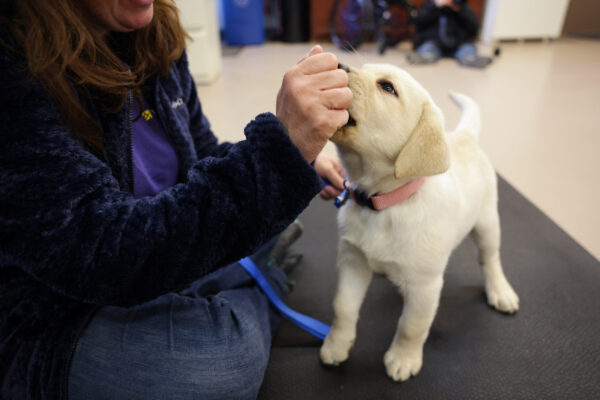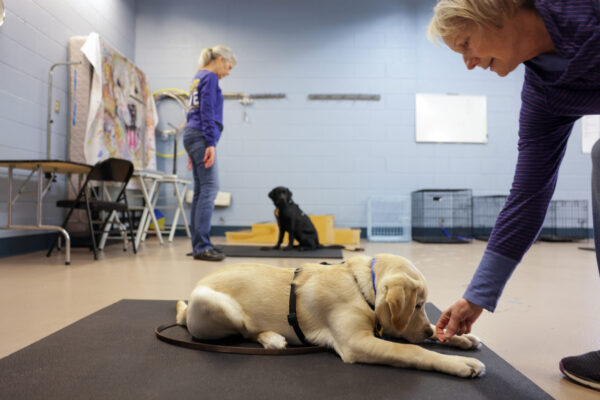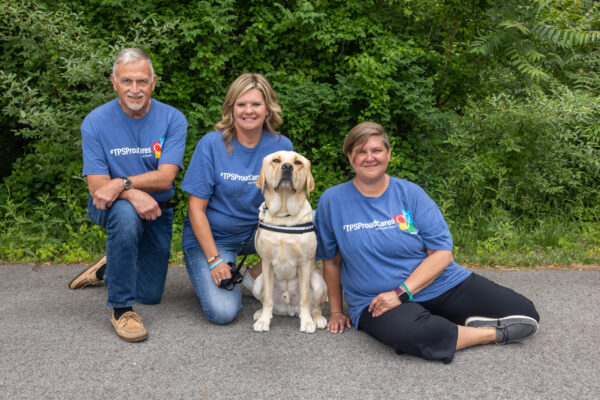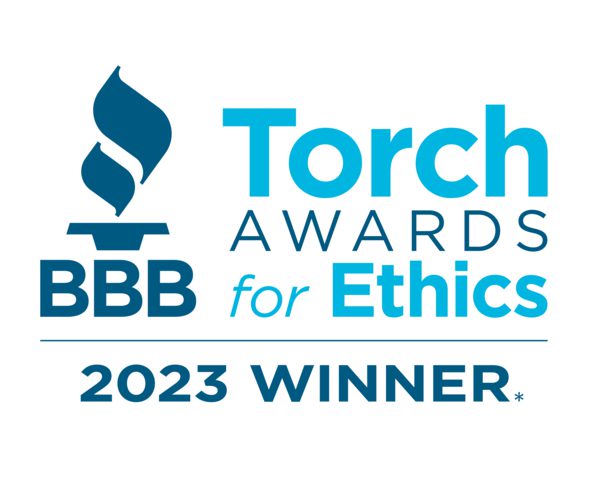Assistance Dogs helps individuals with disabilities achieve greater independence by training and placing service and therapy dogs to aid with the individual’s daily needs.
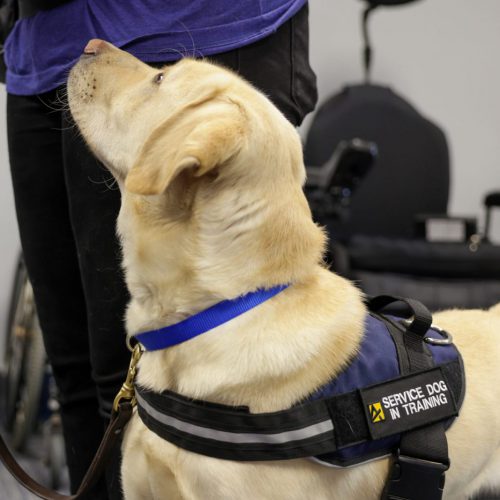
SERVICE DOGS
Service Dogs are trained to assist people with disabilities in living more independently.
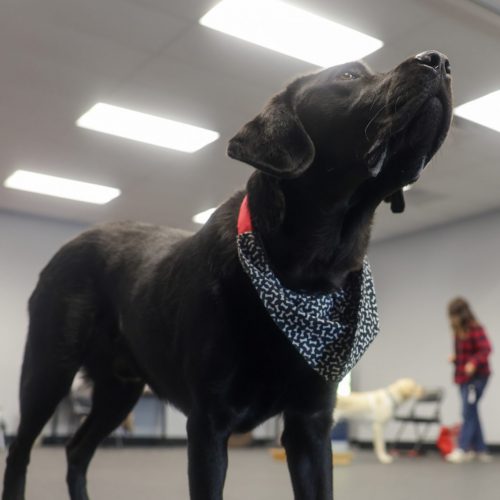
SKILLED COMPANION DOGS
Skilled companion dogs (formerly therapy dogs) offer support and companionship to children and adults with disabilities.
Service Dogs are trained to assist people with disabilities in living more independently.
Consumers partnered with a service dog have public access rights through the Americans with Disabilities Act to take their dogs with them wherever the public is allowed. We train each dog to perform tasks that meet the individual needs of consumers both at home and in public. Here are just some of the tasks service dogs are trained to provide:
- Open doors, cupboards, refrigerators, dryers, etc.
- Retrieve phones
- Activate access buttons and switches
- Tug off clothing
- Carry items
- Pick up dropped items
- Provide counterbalance while walking
You may be eligible for a service dog if you:
- Live within 150 miles of assistance dogs
- Are 12 years old or older
- Have a mobility disability (spina bifida, multiple sclerosis, spinal cord injury, etc.)
Skilled Companion Dogs offer support and companionship to children and adults with disabilities.
They meet therapeutic goals in homes or school districts, including improving speech, coordination, and social skills.
You may be eligible:
- If you live within 150 miles of The Ability Center
- If you are seven years old or older
- If you have a qualifying disability (i.e., autism, down syndrome)
Assistance Dogs currently share a facility with Agility Angels, a local nonprofit that uses the sport of dog agility to help individuals with autism develop social skills, enhance their physical abilities, and gain self-confidence.
With similar missions and programming benefiting the disability community, this partnership improves consumer outcomes for both organizations. Assistance Dogs consumers will now benefit from agility training as part of their experience with our organization.
In collaboration with:
School Facility Dogs help comfort and motivate students.
School facility dogs belong to an individual school and reside with a school staff member. The dogs offer comfort to students in counseling settings, help improve student motivation and social skills, and even provide an audience to encourage students to read. They meet therapeutic goals, including improving speech, coordination, and social skills. School Facility Dogs are treated as faculty members and create a sense of family in the school environment.
Participating Schools
- Bigelow Hill Elementary
- Blue Ridge Elementary
- Bryan Elementary
- Bucyrus Elementary
- Elmwood Elementary
- Fostoria Elementary Schools
- Glenwood Middle School and Early Childhood Center
- Hartville/Lake Elementary Schools
- Lakota Schools
- Lincoln Elementary School
- Monclova Elementary
- North Ridgeville Educational Center
- South Vienna Elementary
- Stranahan Elementary
- Tiffin Elementary Schools
- Tiffin Middle School
- Timberstone
- Waterville Elementary
- Wauseon Elementary and Middle Schools
- Whiteford Agricultural Schools
- Whitehouse Elementary
Much thoughtful effort is put into matching the dogs with their forever partner – to see it all come together in such a memorable way in something very important to the Assistance Dogs Program.
Consumers get the opportunity to meet the foster who has raised, housed, loved, and trained their new assistance dog. They get to spend time together and have lunch on the third day of training.
It’s a very special day where they can connect, pass along little tidbits to the consumer about the personality, likes/dislikes, etc., of the dog, gift presents, and share detailed letters. Meeting face-to-face solidifies that rewarding feeling for volunteers as they see firsthand how their dogs will help.

Assistance Dogs is an accredited member of Assistance Dogs International
FAQs
What happens after I inquire about an assistance dog?
We’ll mail an application packet to your home if you meet the preliminary requirements, requesting written information about you, a medical reference form, and a personal reference form. You will need to return the completed forms and a $50 non-refundable application fee. A staff member from Assistance dogs will contact you for a phone interview after we have received your application. Based on the application and phone interview information, we will schedule an in-person meeting with our client services staff if you qualify. The interview will be videotaped and reviewed by our training staff for approval. We will add you to our waiting list for an assistance dog if approved.
What is the cost?
Assistance Dogs is a nonprofit program that relies on donations, grants, and fundraisers to pay for the placement of an assistance dog. The cost to Assistance Dogs is between $50,000 and $70,000 for each dog placed. Private donors and grants pay most of the expenses. The cost to the consumer is $2,500.
How long is the waiting period for a dog?
Currently, the average wait is 12 to 24 months. The waiting list is a necessity to place the dog with the appropriate client based on the dog’s strengths and the client’s needs and environment.
How are dogs chosen for each client?
Assistance Dogs uses information obtained from applications and personal interviews conducted by our staff to match the skills and qualities of each dog with the needs and desires of each client.
What happens when assistance dogs finds a match for me?
When a dog is available that fits your needs, you are notified and scheduled for team training. Team training is a two-week class for service dog clients, and five-day class for therapy dog clients. Team training consists of lectures, information, practice, and community outings with your new canine partner. This time starts the bonding process that will last a lifetime. After the first two or three days of training class, the dogs will begin spending all their time with their respective partners, returning to their hotels with them in the evening, having breakfast with them in the morning, etc. During that time, clients will assume the responsibilities for the exercising, feeding, and grooming of their dogs.
If you live out-of-town, you must make your own arrangements to stay at a hotel or with friends close to our Education and Training Facility in Sylvania, Ohio. A list of recommended extended stay facilities will be provided. You also need to provide your own transportation to and from our facility and for the public outing portion of our client team training.
How do clients afford the training process?
Prior to receiving their dogs, many clients go to various individuals and groups in their community to ask for financial support. Local organizations are often willing to set up fundraisers to defray travel and living expenses during training class.
Does everyone who comes to training class take home a dog?
No. The decision on how each client is working with his or her dog as a viable team is monitored by an Assistance Dogs staff member daily during training class. The final decision on each client’s ability to return home with the assistance dog will depend on successful graduation of the program. Assistance Dogs staff members will make that final decision.
Once a client goes home with their dog, is the training complete?
No. After completing team training, you and your new assistance dog return home and start adjusting and learning to work together in your home, work, and school environments. The client needs to incorporate Assistance Dogs’ basic cues into a daily routine to continue regular training with his or her dog in the home and in the community. You are required to check in with our training staff on a weekly basis. A home visit is done after 30 to 45 days to help with any problem solving and issues that can arise with the dog changing environments.
After being home for six months, the graduates return to Assistance Dogs for a day-long brush-up class. At this point, the service dog graduates have their first public access test. The ADI Public Access Test is administered to determine eligibility for safe public access with the new team.
At 18 months, the second public access test will be administered. After two successful tests, the probationary period is complete and ownership is transferred to the graduate. *Only the service dogs must complete the public access test.*
After three successful yearly public access tests, the test will then be administered every other year. These bi-annual tests are required to continue public access rights for our service dog graduates.



